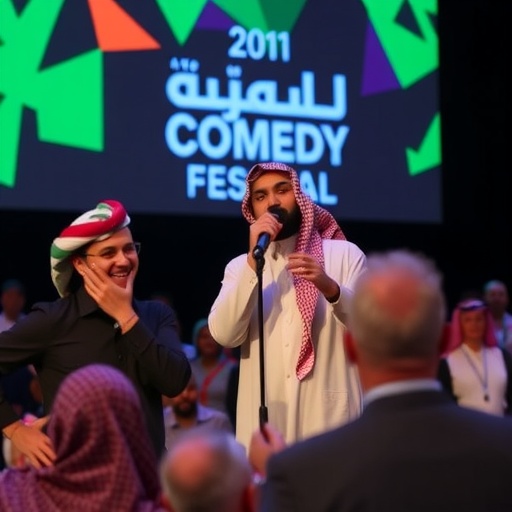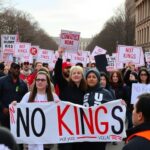Riyadh Comedy Festival Ignites Global Controversy: Comedians Perform Amid Saudi Arabia Human Rights Backlash
In a bold move blending entertainment with international diplomacy, the inaugural Riyadh Comedy Festival kicked off last weekend, featuring over 50 renowned global comedians. However, the event has quickly become a lightning rod for criticism, with human rights advocates accusing Saudi Arabia of using the festival to whitewash its ongoing human rights controversies. As laughter echoed through the opulent venues of Riyadh, protesters outside decried the kingdom’s record on issues like women’s rights and freedom of expression, turning what was meant to be a celebration of humor into a flashpoint for global debate.
The festival, organized by Saudi Arabia’s General Entertainment Authority (GEA), promised a star-studded lineup including international acts from the US, UK, and beyond. Yet, the timing couldn’t be more contentious. Just months after high-profile arrests of activists and reports of escalating crackdowns, the event has drawn sharp rebukes from organizations like Amnesty International and Human Rights Watch. “This is sportswashing 2.0,” said one critic, referring to Saudi Arabia’s strategy of leveraging cultural events to improve its image abroad.
Attendance figures were impressive, with over 20,000 tickets sold out in hours, signaling the kingdom’s push towards cultural liberalization under Crown Prince Mohammed bin Salman’s Vision 2030 reforms. But for many, the glamour masks deeper issues. As the festival unfolds over three days, the tension between entertainment and ethics is palpable, forcing comedians, audiences, and the international community to confront uncomfortable questions about the power of laughter in politically charged spaces.
Star Comedians Take the Stage in Riyadh Despite Protests
The Riyadh Comedy Festival opened with a bang on Friday evening at the Kingdom Arena, where headliners like British comedian Russell Howard and American stand-up superstar Kevin Hart delivered sets that had the crowd roaring. Over 50 comedians from 15 countries participated, showcasing a diverse array of styles from observational humor to satirical sketches. Organizers highlighted the event as a milestone in Saudi Arabia’s entertainment evolution, with GEA Chairman Turki Alalshikh proclaiming it “a bridge of joy connecting cultures.”
Tickets ranged from 200 SAR ($53) for general admission to 1,500 SAR ($400) for VIP packages, attracting a mix of local Saudis, expats, and tourists. Early reports indicate that 70% of attendees were under 35, reflecting the youth demographic targeted by Vision 2030. Performances included Arabic-language acts by regional talents like Egyptian comedian Ahmed El Ghandour, blending local flavors with global appeal. One standout moment came when Hart joked about cultural clashes, quipping, “I’m in Saudi Arabia telling jokes—talk about walking a tightrope!” The audience’s enthusiastic response underscored the festival’s immediate popularity.
Behind the scenes, security was tight, with bag checks and metal detectors at entrances, a nod to the kingdom’s conservative backdrop. Yet, the event’s scale is unprecedented: previous comedy shows in Saudi Arabia were limited to small venues, but this festival spanned multiple stages across Riyadh, including outdoor pop-ups in the Diplomatic Quarter. Comedians underwent pre-approval for content, ensuring no direct jabs at sensitive topics like the royal family or politics—a stipulation that has fueled whispers of censorship among performers.
Statistics from the GEA reveal that the festival generated an estimated 50 million SAR ($13.3 million) in economic impact, boosting local hotels and restaurants. Social media buzz was explosive, with #RiyadhComedyFestival trending worldwide, amassing over 500,000 mentions in the first 24 hours. Videos of highlights went viral, but so did clips of protests outside the venue, where demonstrators chanted slogans against human rights abuses. This duality—celebration inside, contention outside—has defined the event from day one.
Human Rights Groups Slam Festival as ‘Whitewashing’ Tool
The controversy surrounding the Riyadh Comedy Festival stems directly from Saudi Arabia’s human rights record, which remains a sore point internationally. Critics argue that hosting such a high-profile event serves as a veneer over systemic issues, including the imprisonment of women’s rights activists, restrictions on free speech, and the use of the death penalty. Amnesty International issued a statement calling the festival “a blatant attempt to distract from the kingdom’s repression.”
Key flashpoints include the ongoing detention of figures like Loujain al-Hathloul, a prominent women’s driving campaigner arrested in 2018 despite the ban’s lift that same year. Human Rights Watch reported that at least 196 people were executed in Saudi Arabia in 2022, the highest toll in decades, often for non-violent offenses. “While comedians crack jokes on stage, real voices of dissent are silenced in prisons,” said Sarah Leah Whitson, executive director of DAWN (Democracy for the Arab World Now), in an exclusive interview.
Protests erupted in cities like London and New York, coinciding with the festival’s launch. In Riyadh, a small group of expatriate activists gathered peacefully outside the arena, holding signs reading “Laughter Can’t Hide the Tears.” One protester, who wished to remain anonymous for safety reasons, told reporters, “We’re not against comedy; we’re against using it to launder a regime’s image.” The backlash has been amplified online, with petitions on Change.org garnering over 10,000 signatures urging performers to boycott.
Saudi Arabia’s human rights controversies aren’t new. The 2018 killing of journalist Jamal Khashoggi in the kingdom’s Istanbul consulate drew global outrage, and recent UN reports have criticized the use of cyber-surveillance against dissidents. Festival detractors point to these as evidence that cultural openings are superficial. “Reforms like allowing concerts are progress, but they don’t erase the arrests of those who pushed for them,” noted a report from the European Parliament’s human rights committee, which monitored the event closely.
Economically, the kingdom invests heavily in entertainment to diversify from oil dependency. The GEA, established in 2016, has poured billions into events, from the Saudi F1 Grand Prix to music festivals. Yet, activists contend this “soft power” strategy glosses over hard realities. A 2023 Freedom House index ranked Saudi Arabia 163 out of 195 countries for civil liberties, scoring just 7 out of 100. As the festival progresses, these voices grow louder, questioning whether humor can coexist with such constraints.
Saudi Officials Push Back, Highlighting Reform Efforts
In response to the uproar, Saudi officials have defended the Riyadh Comedy Festival as a genuine step towards openness. Turki Alalshikh, in a press conference, emphasized, “This event celebrates freedom of expression within our cultural context. It’s about building bridges, not ignoring challenges.” The kingdom points to tangible reforms under Vision 2030, such as the 2019 relaxation of guardianship laws for women and the influx of international tourism, which saw 100 million visitors projected by 2030.
The GEA’s initiatives have transformed Saudi Arabia’s entertainment landscape. Prior to 2017, public concerts were banned, but now events like the Jeddah Season draw millions. The comedy festival fits this narrative, with organizers claiming it promotes “inclusive dialogue through laughter.” Alalshikh noted that 40% of the performers are women, including Saudi native comedienne Shaden Al-Safar, who performed a set on modern life in the kingdom. “We’re evolving, and events like this show our commitment to youth and creativity,” he added.
Government data supports the progress angle: female workforce participation has risen from 18% in 2016 to 33% in 2023, and cinema attendance has surged with over 60 theaters now operational. Defenders argue that criticism overlooks these gains. “Human rights evolve through engagement, not isolation,” said Saudi Ambassador to the UN Abdulaziz Alwasil in a recent op-ed for The New York Times. The festival’s programming includes workshops on comedy writing, aimed at empowering local talents and fostering a nascent Saudi comedy scene.
Internally, the event has sparked mixed reactions. Conservative clerics have grumbled about Western influences, while younger Saudis embrace it. A poll by Arab News found 65% of respondents viewed the festival positively, seeing it as a sign of modernization. However, the government’s rebuttals haven’t quelled all doubts. International media, from BBC to Al Jazeera, have covered the dichotomy, with headlines questioning if “laughter is the new oil” for Saudi Arabia’s image rehab.
Financially, the festival underscores the kingdom’s ambitions. With a budget exceeding 100 million SAR, it’s part of a broader $13 billion entertainment investment by 2030. Supporters like economist Abdullah Al-Maghlouth argue it creates jobs—over 5,000 for this event alone—and stimulates creativity. As day two wrapped up, officials announced plans for annual editions, signaling long-term commitment despite the controversy.
Performers Grapple with Ethical Dilemmas on Saudi Stages
For the comedians at the Riyadh Comedy Festival, the human rights controversy presents a personal quandary. Many performers arrived amid boycott calls, weighing financial incentives against moral concerns. Kevin Hart, whose fee was reportedly $500,000, defended his participation: “I’m here to spread joy, not politics. Change comes from within.” Similarly, Russell Howard told Variety, “I’ve performed in tough places before; dialogue through comedy is powerful.”
Not all agreed. South African comedian Trevor Noah, who declined an invitation, tweeted, “Humor should punch up, not cover up.” His stance resonated with peers like Hannah Gadsby, who pulled out citing Saudi Arabia’s LGBTQ+ record, where same-sex relations can lead to imprisonment. The festival’s lineup notably lacks openly queer performers, a point critics have seized upon. “It’s selective openness,” observed one UK-based agent anonymously.
Local Saudi comedians face unique pressures. Shaden Al-Safar, a trailblazer in the male-dominated field, navigated her set carefully, focusing on everyday absurdities rather than taboos. In an interview with Reuters, she said, “Performing here is risky but rewarding. We’re testing boundaries.” Other Arab acts, like Lebanese comedian Nabil Abboud, used the platform to subtly address regional issues, earning applause for their nuance.
The ethical debate extends to agents and promoters. Hollywood’s involvement, via partnerships with Live Nation, has drawn scrutiny. A 2022 investigation by The Guardian revealed that some US comedians receive “reform clauses” in contracts, tying payments to Saudi progress on rights. Yet, data from Pollstar shows Middle East gigs now account for 15% of top comics’ tours, tempted by lucrative deals amid post-pandemic recovery.
Personal stories abound. One American performer, speaking off-record, admitted, “The money’s great, but I feel complicit.” Others see it as an opportunity for change: “If we don’t go, who will influence?” This internal conflict mirrors broader industry trends, from musicians boycotting to athletes competing in the Saudi-backed LIV Golf. As the festival nears its close, performers’ choices will likely shape future invitations, with many vowing to use their platforms for advocacy.
Future of Cultural Events in Saudi Arabia Hangs in Balance
As the Riyadh Comedy Festival concludes, its legacy remains uncertain, poised between cultural triumph and diplomatic minefield. Organizers report record attendance and positive feedback, with plans already underway for a 2025 edition featuring even more international stars. Yet, the human rights backlash could deter future talent, potentially isolating Saudi Arabia’s entertainment push.
Looking ahead, the kingdom’s strategy hinges on balancing reforms with reputation management. Upcoming events like the Riyadh Season, expected to host 15 million visitors, will test this. International pressure may intensify, with the UN Human Rights Council set to review Saudi Arabia in 2024. Activists hope the controversy sparks dialogue, while officials eye it as validation of their vision.
For global comedians, the festival marks a crossroads: engage to influence or abstain to protest? Industry watchers predict a hybrid approach, with more conditional participations. Economically, success could accelerate diversification, creating 1 million jobs by 2030 per GEA projections. Socially, it might normalize Saudi Arabia as a cultural hub, but only if rights improve.
In the end, the Riyadh Comedy Festival has proven that laughter, while universal, can’t escape politics. As echoes of applause fade, the real punchline may be how this event influences Saudi Arabia’s path forward—toward greater openness or continued contention. Stakeholders on all sides await the next act.








